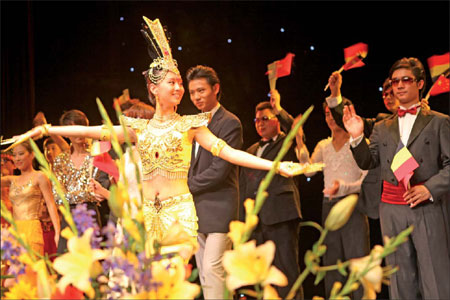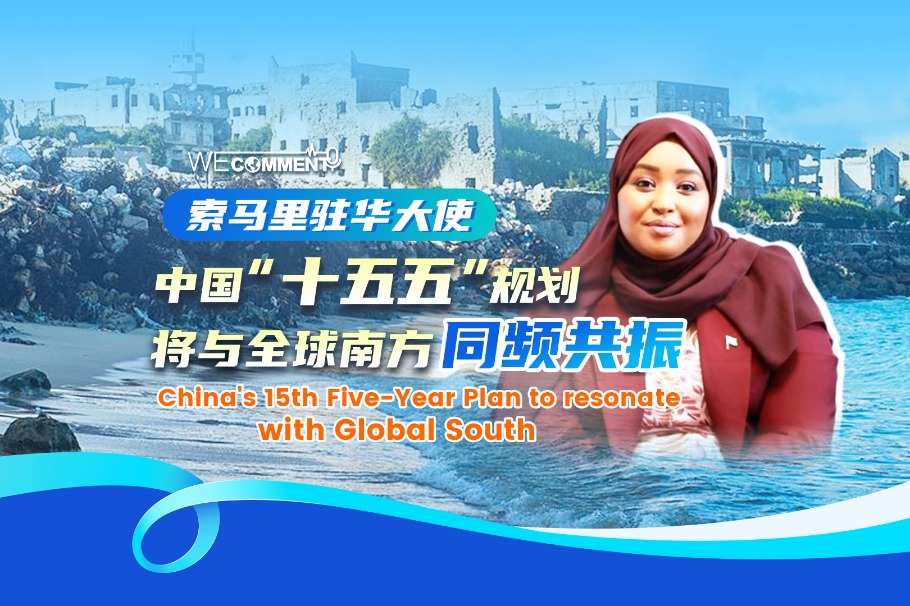New strand in China-EU ties has people at the forefront

Reasonable, objective approach needed to mitigate differences
 |
| China Disabled People's Performing Art Troupe actors pose after their recent performance in Brussels, which impressed both Chinese and foreign audiences. Fu Jing / China Daily |
Beijing and Brussels are weaving a third strand in their relationship by bolstering people-to-people exchanges.
State Councilor Liu Yandong is to visit the European Union headquarters in Brussels from April 17 to 19 and will launch the first China-EU High Level People-to-People Exchange Dialogue with her EU counterpart.
It will be the third strand in the relationship, the other two being strategic dialogue between the State Councilor Dai Bingguo and the EU foreign policy chief Catherine Ashton and dialogue on the economy and trade between Vice-Premier Wang Qishan and three European commissioners.
"This visit is likely to encourage more exchanges and strengthen mutual knowledge and understanding between our two peoples, gathering more public support for renewed China-EU friendship," says Wu Hailong, China's new ambassador to the EU.
In his first two months in Brussels, Wu said, he has been impressed by the dynamics of the relationship and the goodwill expressed by officials, business people, experts, those in academia, and others on both sides to explore the potentials of cooperation.
Building on all these encouraging developments, Wu says, he feels confident his term will be fruitful.
"But at the same time, different views still exist among the public of the two sides, especially on the issues of human rights, religion, and policies on ethnic minorities."
Wu says China and Europe are hugely different from each other in history, culture, tradition, philosophy and their social systems. But on top of those differences is the fact that China is the largest emerging economy and Europe the largest developed economy.
It is natural that both sides will have their differences, he says.
"However, it is essential that we take a reasonable and objective approach to handle them prudently instead of intentionally magnifying or playing up these differences."
Only by strengthening people-to-people exchanges can mutual recognition and understanding be improved and public support for the relationship be gained, he says.
"Then the comprehensive strategic partnership between Beijing and Brussels can be enriched and sustained in the long run."
China is being highly active in boosting the relationship, which, he says, has "global significance". Leaders on both sides have shown great determination to enhance the relationship through official and people-to-people channels.
This year the number of high-level visits will reach an all-time high, Wu says.
In February a China-EU summit was held in Beijing, at which a five-page communique was issued that stated the importance of China being granted market economy status and foreshadowed negotiations on an investment pact.
During Liu Yandong's visit, several events are being held in Brussels, including ones touching on culture, media, energy and climate change.
On April 18 the Swedish consultancy company 21st Century Frontiers and the Research Center of Journalism and Social Development of Renmin University of China will organize a seminar on China's global media image.
"We will reveal some striking findings based on our quantitative research of the Western media," says Dennis Pamlin, director of 21st Century Frontiers, whose organization and the university have done joint research on how China has been reported by Western magazines over the past 30 years.
Pamlin says that after decades of development, China, as a global player, has presented itself in colorful and attractive images.
"But some editors in the Western press have pretended to ignore this. For decades they have mainly used illustrations of the national flag, the dragon, and the portrait of late chairman Mao Zedong to describe China."
Pamlin suggests that dialogue with Western media and editors is critical.
"They should know the stories and faces of this changing country and its people," Pamlin says.
Apart from the media dialogue, more than 200 participants from China and Europe will attend a two-day international conference on energy and climate change in Brussels, organized by the College of Europe in Bruges.
"China and Europe have great potential in green cooperation, and this should be a major front for people-to-people exchanges," says Men Jing, professor of China-EU relations at the college.
The EU can boast of green technologies in agriculture, industry, urbanization, environment protection and people's daily life, she says.
"And China has offered tremendous possibilities and market opportunities during industrialization and urbanization in sharpening these inventions with the EU.
"This is an ideal match both sides should explore further."
In China-EU relations last year the accent was on youth exchanges, and this year the focus is on intercultural promotion.
Steve Zhao, a well-known Chinese photographer, says the two sides need to understand each other through mediums such as arts and music.
"My aim is to get Europeans to know the true and beautiful China."
Zhao's photos focus on ordinary Chinese and on folk culture, taking in grand landscapes and quiet towns, the young and the old, ethnic groups, farmers, folk artists and dance in its many forms, from local varieties to the Peking Opera.
"My aim is to catch the most touching and beautiful moments; those smiling faces can help bridge the gap in understanding between Western and Eastern cultures and traditions."
Zhao's photos were exhibited in the European Parliament and the European Commission last year, and he says he plans to organize a touring exhibition across Europe this year, hoping it encourages people to visit China.
"Of course, I also take attractive photos of Europeans and show them off in China. I always say that cultural exchange is a two-way street."
Brigitte de la Royere, director of Euro-China Audiovisual Network in Brussels, says the EU and China have set up many official exchange programs and she hopes these can bear the fruit of "real communication" between people.
De la Royere, who promotes China's films in the West, says exchanges that emanate from the grassroots will be welcomed by Chinese and Europeans alike.
For years she has organized Chinese film exhibitions in Europe and shows Chinese films twice a week in a studio in Brussels. She hopes organizations such as hers can obtain recognition and benefit from government-supported exchanges.
Contact the writer at fujing@chinadaily.com.cn
Today's Top News
- Lawmakers' thousands of proposals receive responses
- China warns Japan against interference
- Nation's euro bond sale shows investors' confidence
- No soft landing for Tokyo's hard line
- Commerce minister urges US to increase areas of cooperation
- Strong demand for China's sovereign bonds signals global confidence






























